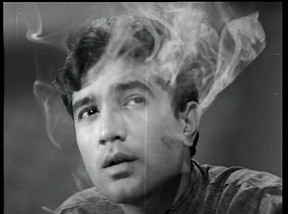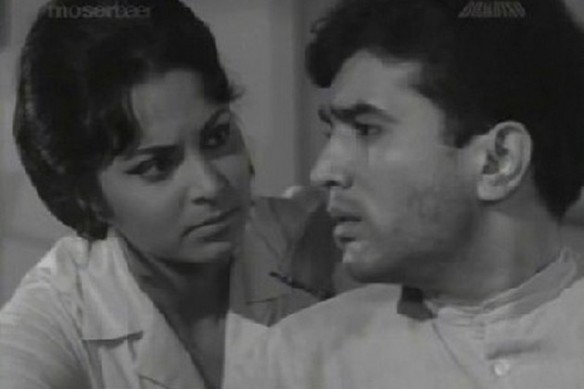Our next post will explore the stirring lyrics and translation of “Woh Shaam Kuch Ajeeb Thi” from Khamoshi (1967.) A one-of-a-kind film from its generation, Khamoshi is the moving story of patients in an insane asylum and the woman who treats them played by the graceful Waheeda Rehman. In American and European films, the theme of mental illness, the dangers of institutionalism, and the murky line between doctor and patient had been explored quite frequently–such as with famous German Expressionism’s The Cabinet of Dr. Calighari (1931), Hitchcock’s Spellbound (1958), and of course, One Flew Over the Cuckoo’s Nest (1976). However, in Bollywood, the Asit Sen hit Khamoshi vividly remains the only film from that era to have fully explored this theme.
Based on the short story “Nurse Mitra” by Ashutosh Mukhopadhyay, Khamoshi shines with wonderful performances, exquisite musical compositions, and disturbing black-and-white cinematography. Interestingly, Suchitra Sen starred in the original Bengali version Deep Jwele Jaai (1959) also directed by Asit Sen!
In this song, Rajesh Khanna, a patient at the mental institution where Waheeda works, takes her on a boat and declares his love for her. Still recovering from an episode in which he was jilted by a former girlfriend, Rajesh blurs his memories of the two women in these lyrics. Little does he know, his blind, albeit misguided love is the final provocation for Waheeda Rehman to lose her own sanity as she struggles to recover from having also lost one she once loved.
Woh Shaam Kuch Ajeeb Thi Lyrics and Translation:
Woh shaam kuch ajeeb thi
There was something strange about that evening,
Yeh shaam bhi ajeeb hai
Just as this evening feels strange
Woh kal bhi paas paas thi, woh aaj bhi qareeb hai
She was close to me yesterday, she is near me today as well
Woh shaam kuch ajeeb thi
There was something strange about that evening
Jhukii hui nigaaho.N mei.N, kahii.N meraa khayaal thaa
In her lowered gaze, perhaps there was a thought of me
Dabi dabi ha.Nsii mei.N ek haseen saa gulaal tha
As she suppressed a smile, there was a burst of beautiful color
Main sochtaa thaa meraa naam gungunaa rahi hai woh
I used to think that she was singing my name
Na jaane kyo.N laga mujhe ki muskuraa rahi hai woh
I do not know why it seemed to me that somewhere she is smiling
Woh shaam kuch ajeeb thi
There was something strange about that evening
Meraa khayaal hai abhii jhuki hui nigaaho.N mei.N
Now thoughts of me are in her shy, lowered gaze
Khulii hui hansi bhi hai, Dabii huii sii chaah mei.N
Even though she is laughing openly, there a hidden desire
Mai.N jaanta hoo.N, meraa naam gungunaa rahi hai woh
I know that she is singing my name
Yehii khayaal hai mujhe ki saath aa rahi hai woh
It appears to me that she is coming closer
Woh shaam kuch ajeeb thi
There was something strange about that evening
Glossary:
shaam: evening; ajeeb: strange; qareeb: close, near; jhuka: lowered; khayaal: thought; ha.Nsii: laughter; gulaal: color [like those thrown during the festival of holi]; muskuraanaa: to smile; khula: open; chaah: want, desire

Rajesh Khanna checks in to the kind of hospital where smoking is permitted, and professionalism in doctor-patient relationships remains conveniently undefined…Khamoshi (1967)
For whoever can’t handle the suspense, the film ends with Waheeda being committed to her own institution and Rajesh Khanna declared sane–with the implication that one day perhaps another doctor will fall in love with her and the roles will reverse yet again. It is a cold and disturbing message filmed with some of the purest cinematographic beauty in Bollywood. I’ll spare you from a discussion of subversive political symbolism, but I will point out one last bit of trivia:
In the Bengali version, the Hemant Kumar song “Ai Raat Tomar Amar” is filmed with the same mis-en-scene as “Tum Pukar Lo” in Khamoshi, however, the melodies are not the same! “Ai Raat Tomar Amar” is in fact the musical predecessor of “Yeh Nayan Dare Dare” from Hemant Kumar’s later soundtrack in Kohraa (see our post on Bollywood film noir for more). Music directors back then were notorious for reusing compositions–and we’re sure glad they did!
-Mrs. 55



It can be easily discerned that the writer is well learned and well cultured in Bollywood. I also appreciate the comparison of Khamoshi to American and European contemporary films. Fine article!
Thanks for reading! The insane asylum film had become a kind of thriller genre in Hollywood in ways that did not seem to affect Indian audiences. It’s an interesting phenomena–especially to note how that’s changed since the 60s!
This was also a strange Hindi movie plot ending in the sense that it did not have a happy ending. It probably left many a movie goer with a strange new feeling of perhaps not having a final satisfying conclusion of Waheeda’s fate that did not come with many other lighter movies.
Agreed! Many of Waheeda’s best films (with the exception of Guide) ended on pretty happy notes, so seeing her play this role only emphasizes her versatility as an actress. She transformed from an insecure prostitute in Pyaasa to a bratty rich girl in Sahib Bibi Aur Ghulam to a conflicted hard-working nurse in Khamoshi. Waheeda is definitely one of Bollywood’s best!
TODAY RAJESH KHANNA DIED .AND TODAY I FOUND A LOT YOUTUBE MUSIC ON WOH..
I GOT IT TRANSLATED WITH YOUR HELP
THANKS A LOT
TODAY I FEEL AJEEB
Pingback: Which Actor Did Hemant Kumar Sing For Best? « Mr. & Mrs. 55 – Classic Bollywood Revisited!
Thanks for the translation… there were so many meaningful films done during that time… I now fully understand the meaning of the song…
one of the finest & heart touching feeling lines,compares both past and present together at a same time forever
Pingback: Tum Pukar Lo Lyrics and Translation: Let’s Learn Urdu-Hindi | Mr. & Mrs. 55 - Classic Bollywood Revisited!
One of my favourite songs ever! Thanks for the lyrics and the translation.
From your introduction, it looks like it might have been a good movie, but how come most Hindi (or Indian) movies are no match for western ones? Even with a good concept (such as this one), Indian moviemakers end up spoiling it with melodrama, unrealistic situations, fake emotions, over-acting, etc.
The credit for this song belongs to whom ? To Gulzar Sir, or Asit Sen ? or Hemanth Mukherji or Kamal Bose ? No doubt! All are given life for a wonderful song. I mesmerized to see Waheeda ji after her thousands of expressions in this song. Last but not at all least I am so happy to see your perfect review on this song. Thanks! (a simple word which may not replace any other word in English) for your efforts.
the only film that had kaka and waheeda together-superlative performances, with kaka rekindling his partnership with asit sen (safar)———–brilliant
I feel very happy to read this translation i am very gratitude to this website because i have been listening without knowing the meaning.
Wonderful page. It pulls non-Hindi people who love Hindi songs. Thank you. Looking forward to more gems from you. Best wishes.
I am going to steal your English translation and post it at my own blog, while giving a reference to your post, of course 🙂
Probably the best song Kishore Kumar sang which says a lot as he has some great ones to his credit. The scene was also a directorial phenomenon with Waheeda Rehman’s expressions of futility on how her treatment (and love for her patient) were simply not progressing and Rajesh Khanna’s melancholy nostalgia while relying so much on his present nurse. Good job of translating.
Thank you for this.